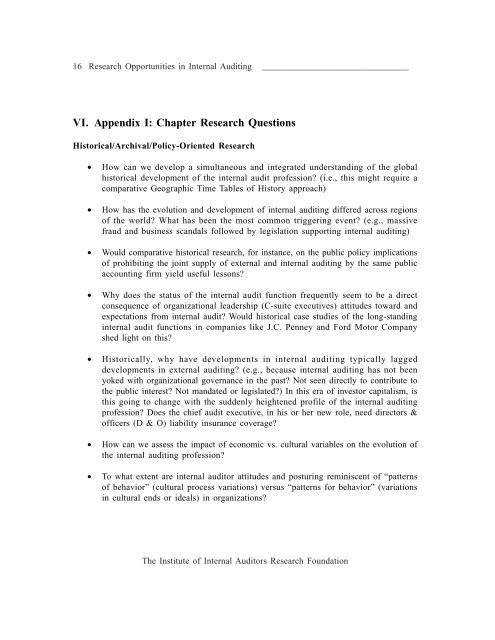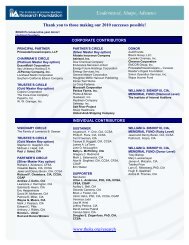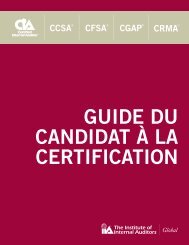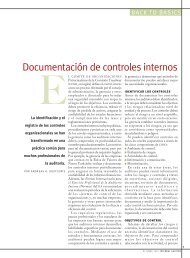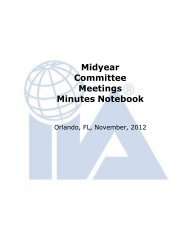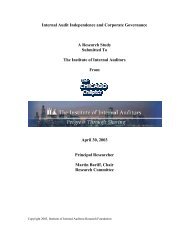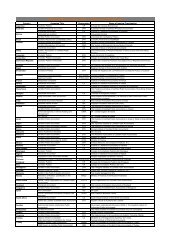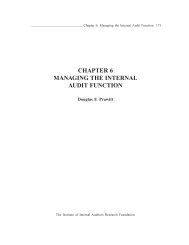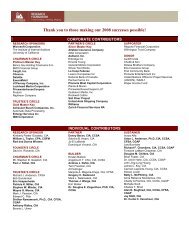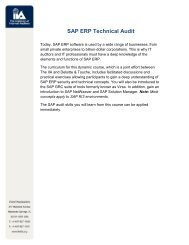Chapter 1.pmd - The Institute of Internal Auditors
Chapter 1.pmd - The Institute of Internal Auditors
Chapter 1.pmd - The Institute of Internal Auditors
Create successful ePaper yourself
Turn your PDF publications into a flip-book with our unique Google optimized e-Paper software.
16 Research Opportunities in <strong>Internal</strong> Auditing _________________________________<br />
VI. Appendix I: <strong>Chapter</strong> Research Questions<br />
Historical/Archival/Policy-Oriented Research<br />
• How can we develop a simultaneous and integrated understanding <strong>of</strong> the global<br />
historical development <strong>of</strong> the internal audit pr<strong>of</strong>ession? (i.e., this might require a<br />
comparative Geographic Time Tables <strong>of</strong> History approach)<br />
• How has the evolution and development <strong>of</strong> internal auditing differed across regions<br />
<strong>of</strong> the world? What has been the most common triggering event? (e.g., massive<br />
fraud and business scandals followed by legislation supporting internal auditing)<br />
• Would comparative historical research, for instance, on the public policy implications<br />
<strong>of</strong> prohibiting the joint supply <strong>of</strong> external and internal auditing by the same public<br />
accounting firm yield useful lessons?<br />
• Why does the status <strong>of</strong> the internal audit function frequently seem to be a direct<br />
consequence <strong>of</strong> organizational leadership (C-suite executives) attitudes toward and<br />
expectations from internal audit? Would historical case studies <strong>of</strong> the long-standing<br />
internal audit functions in companies like J.C. Penney and Ford Motor Company<br />
shed light on this?<br />
• Historically, why have developments in internal auditing typically lagged<br />
developments in external auditing? (e.g., because internal auditing has not been<br />
yoked with organizational governance in the past? Not seen directly to contribute to<br />
the public interest? Not mandated or legislated?) In this era <strong>of</strong> investor capitalism, is<br />
this going to change with the suddenly heightened pr<strong>of</strong>ile <strong>of</strong> the internal auditing<br />
pr<strong>of</strong>ession? Does the chief audit executive, in his or her new role, need directors &<br />
<strong>of</strong>ficers (D & O) liability insurance coverage?<br />
• How can we assess the impact <strong>of</strong> economic vs. cultural variables on the evolution <strong>of</strong><br />
the internal auditing pr<strong>of</strong>ession?<br />
• To what extent are internal auditor attitudes and posturing reminiscent <strong>of</strong> “patterns<br />
<strong>of</strong> behavior” (cultural process variations) versus “patterns for behavior” (variations<br />
in cultural ends or ideals) in organizations?<br />
<strong>The</strong> <strong>Institute</strong> <strong>of</strong> <strong>Internal</strong> <strong>Auditors</strong> Research Foundation


